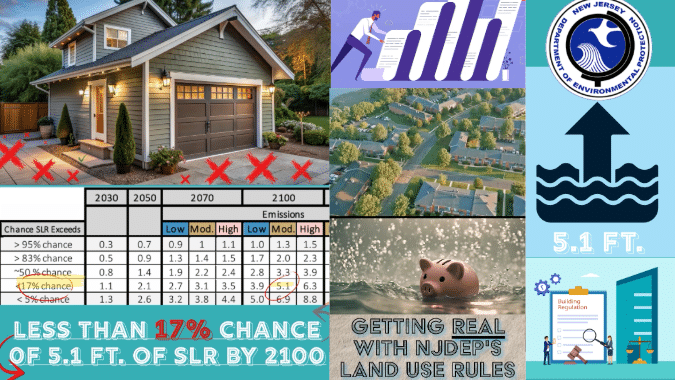NJBIA announced today it is releasing a short, online video series to bring more awareness to the deep and problematic impacts of new Land Use rules proposed by the state Department of Environmental Protection.
NJBIA’s ‘REALity Check’ series will simplify the many extreme conditions DEP is requiring to build or rebuild under its Resilient Environments and Landscapes (REAL) reforms, and the real-world ramifications of those rules on residents and businesses in shore, bay and river communities in the state.
“We don’t expect the public or the press to read a 1,000-page rule, but they should all be aware of how extreme it is and what the bottom-line impacts are on residents throughout the state and our economy,” said NJBIA Deputy Chief Government Affairs Officer Ray Cantor.
“The purpose of this video series is to explain the consequences in a very short and palatable format so the public can understand and voice their concerns, so a greater number of mayors can continue to protest these rules and so our lawmakers in Trenton get involved before this overreach by the DEP is finalized. There’s a lot at stake here.”
Videos will be released on NJBIA’s social media channels throughout the current DEP comment period for the REAL Rules.
Short-form videos released today include:
- REALity Check 1: The REAL Story About DEP’s ‘No-Build’ Zones
Description: The DEP says its proposed Land Use rules won't create 'no build zones' in shore, bay and river communities. But with these extreme restrictions on building and rebuilding, what else would any reasonable person call it? - REALity Check 2: How the DEP is Starting a Retreat of Shore and River Communities
Description: Don't think the DEP is actually starting a retreat of New Jersey shore, bay and river communities with its proposed and extreme Land Use rules? Don't take our word for it. The DEP writes about it in its own climate change strategy. - REALity Check 3: The Truth Behind the 'Science' of DEP's Land Use Rules
Description: The DEP is establishing dramatic and expanded 'Inundation Risk Zones,' forcing homes and buildings to build or rebuild a whopping 5 feet over current flood standards, based on dated and low-confidence science that exceeds anything forecasted by climate scientists anywhere else.
NJBIA has been steadfast in opposing DEP’s Land Use rules as currently proposed in part due to establishment of “inundation risk zones,” which will require building or rebuilding of structures of 5 feet higher than existing flood elevation standards.
Other conditions include only the allowance of only 3% impervious cover and a deed notice requirement from a home seller explaining to a buyer that their property will someday be underwater – even if it is in an area that has never flooded.
The DEP is basing these conditions on outdated science and low-confidence data from a 2019 study.
“It is appropriate for the DEP to incorporate sea level rise in their updated land use rules, but sadly they are far too extreme in their projections and overly burdensome with these proposed regulations,” Cantor said.
“No one in the climate science community is forecasting 5 feet of sea level rise in 75 years and you don’t create life-changing, potentially economically devastating policy upon a low-confidence data point – and certainly not without input from the Legislature.
“We continue to strongly encourage the DEP to focus on resiliency over retreat, and to use a sea level rise standard of 2 feet. That number is in line with generally accepted national and international projections and would still make New Jersey the most protective state in the nation. If sea level rise is shown to be trending higher, we have 75 years to adjust,” Cantor said.




